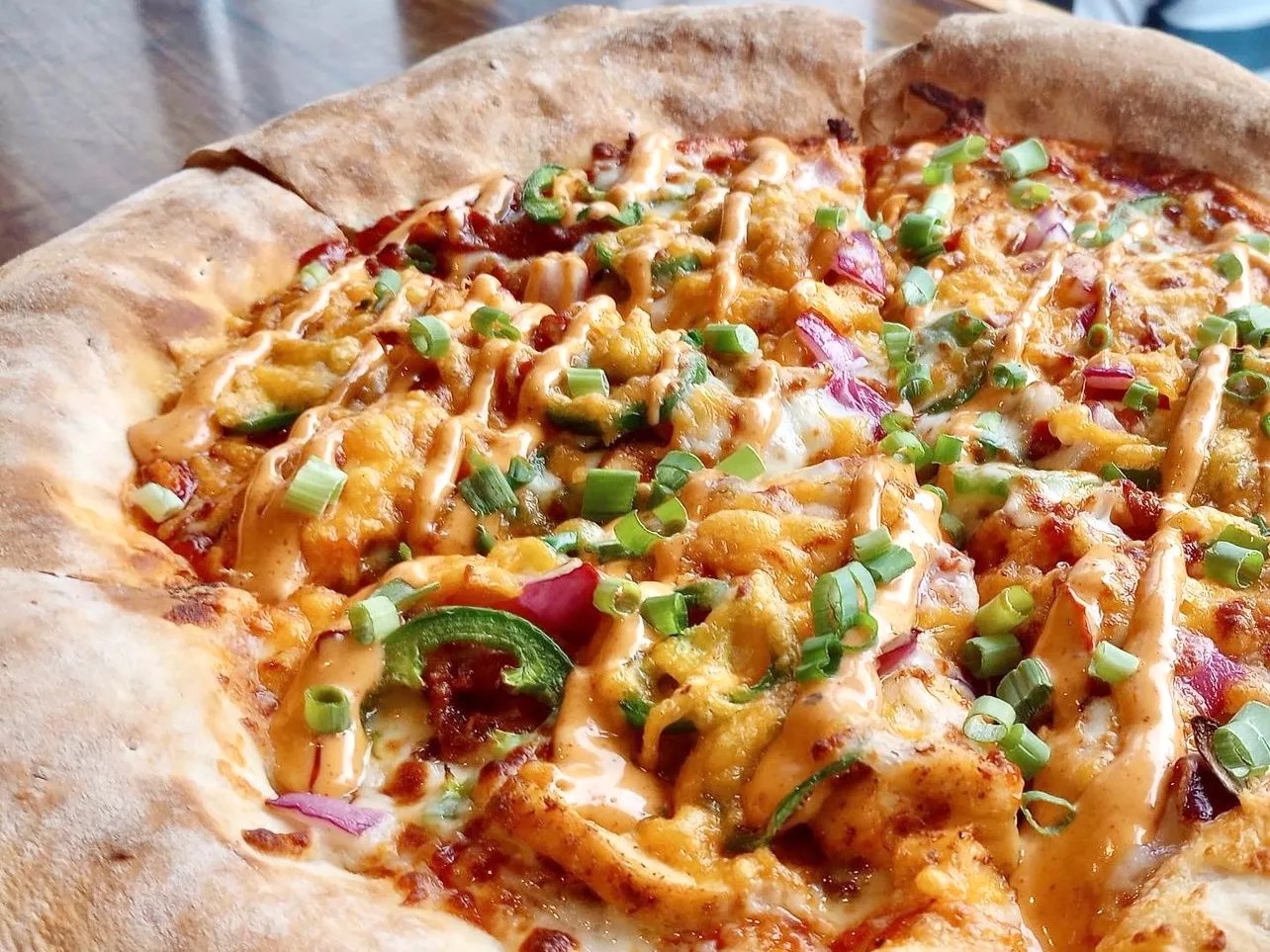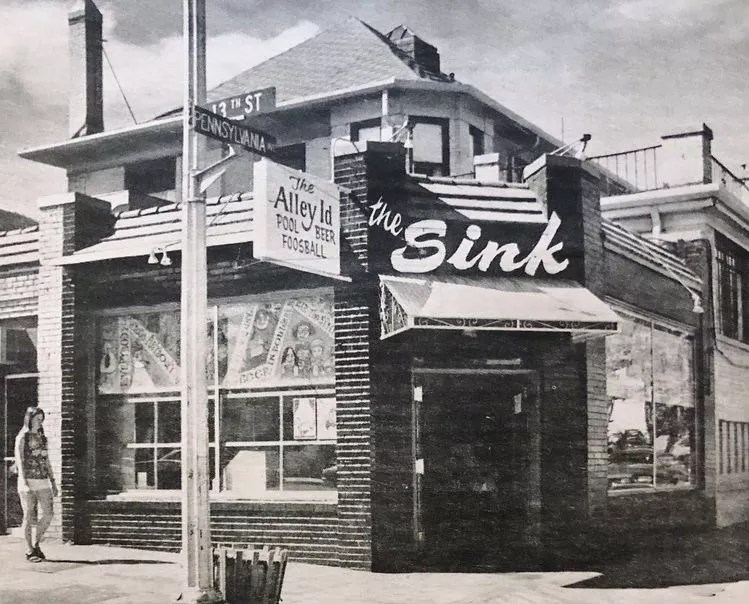
Courtesy the Sink

Audio By Carbonatix
Colorado’s truly legendary restaurants are few and far between, and they are becoming scarcer. Between notoriously minuscule profit margins, ever-increasing costs and the many, many rigors of the 2020s, it’s not surprising that many well-established joints – even those that have served customers for decades – are bowing out of business when buildings are sold, leases are up, or owners just plain need a rest.
If the lazy dog curled up next to you on the sofa ages the equivalent of seven years every 365 days, one busy restaurant year is equivalent to at least fifteen human years.
So it’s a major accomplishment that The Sink, a no-frills bar at 1165 13th Street in Boulder, has stuck around for a century (in human years!). Even so, Mark Heinritz, who currently owns the spot with his brother Chris and business partner Tell Jones, says the anniversary snuck up on them. “Honestly, it just sort of dawned on us in the last six or seven months that we’ve got to do something,” he laughs.
Heinritz was just 26 when he and his brothers bought the Sink in 1992. At the time, the spot that originally opened as Somer’s Sunken Gardens had already been in been in business for nearly seventy years under various owners and names; it was LeBaron’s Sunken Gardens and then Sunken Gardens Fine Food until 1949, when it was formally dubbed the Sink and became a 3.2 bar that sold the 3.2 percent beer that eighteen-year-olds were allowed to drink for generations in this state.
In the late 1950s, artists Mike Dormier and Llloyd Kavich (who, the Sink’s website notes, styled his name with three Ls “just for the ‘L’ of it”) lavished every inch of the interior with irreverent, cartoonish murals that gave the space, with its low, low ceilings, the vibe of your coolest friend’s basement; it was the perfect place to drink, jaw at your buddies and screw around undisturbed.
Heinritz didn’t necessarily consider the restaurant’s already impressive history when his crew purchased it. “We signed a ten-year lease, and that seemed like a lifetime,” he recalls. At the time, Heinritz was living in Fort Collins and working in a cabinet factory, and none of the family had much restaurant experience. “My brother James was living in Boulder,” Heinritz recalls. “He was talking to [then-owners] the Kauvars about property listings. After talking with James for a while, they said, ‘We’re thinking of selling this place.’ That’s what got the ball rolling. … It’s really been a very lucky journey.
“One thing Herbie [Kauvar] told me,” Heinritz continues, “is that the hardest thing is staying relevant.” The owners have done that by emphasizing the Sink’s food, he says. It also tapped local microbrews (it was the first Boulder bar to serve New Belgium’s Fat Tire) and purchased grass-fed beef for its burgers way back in 2004.
As TV shows devoted to food became more popular, the Sink appeared on a certain spiky-haired Food Network personality’s series, and its popularity grew. “Boulder became the world’s foodiest town for a year, and we were right there with it,” Heinritz says.
The Sink’s increased focus on food is partly a result of the way Boulder’s drinking and music scenes have shifted over the years. “When we bought in ’92, the culture around alcohol and music was very, very different,” Heinritz recalls. “We were doing most of our sales after 10 p.m., and now we close at 10 p.m. most days.” The Sink used to have an entire staff dedicated to the late-night crowd; Heinritz questions whether that will ever make a comeback.
The consequences of serving alcohol to underage patrons have changed drastically, as well. “Back in the ’90s, it was a little wink and a nod: Keep it in balance, don’t be a jerk about it,” he says. Now, serving a brew to a twenty-year-old could mean a total shutdown for three to ten days. Those 3.2 days are long gone.
And then there was that little bump in the road called COVID. “Life keeps shifting,” Heinritz adds pragmatically. “It is a different discipline. Slowing things down makes sense.”

The Heinritzes introduced the Sink’s “ugly crust” pizza shortly after they bought the business in 1992.
Courtesy the Sink
As owner of the bar, Heinritz has become a custodian of the Sink’s history – not only of the 31 years under his watch, but of the happenings before his time. He talks about the goings-on in the 1960s and ’70s as if he was there himself. “Back in the early ’60s, 28th Street was a dirt road. Think about how small Boulder was at that point,” he says. “The social scene was at the Hill.”
With only a couple of watering holes on the Hill at the time and no cell phones to coordinate plans, customers converged upon the bar at the beginning of the weekend, and the Friday Afternoon Club (FAC) was formalized in the late 1960s: Guests would rent formal wear from a shop up the block before settling in for brews and music and 3.2 beer, which “was the activity,” says Heinritz. “At some point, the Sink sold more Coors than anywhere else in the country.”
Many of the Sink’s pivotal moments and its roster of famous visitors, which includes former president Barack Obama, chefs Anthony Bourdain and Eric Ripert, and Robert Redford, who famously swabbed floors as an employee back in 1955, are chronicled on the Sink’s website. Heinritz’s favorite visitor – other than Redford (“such a cool guy”) – was former Denver resident Madeleine Albright, Bill Clinton’s secretary of state and the first woman to hold that position. “That was such a shocker,” he recalls. “I said to her, ‘If you don’t mind me asking, why did you choose to come here?’ She said, ‘My sister used to babysit for the Kauvars.’ There are all these tentacles that reach back through our history.”

The Sink circa 1963.
The Sink resurrected some of that history this year by bringing back the FAC, with one scheduled for the last Friday of every month for the remainder of the year. Additional celebrations in the works include a September exhibit at the Museum of Boulder, which will feature old murals that used to hang in the Sink’s windows.
But first, a documentary about the bar will debut on Wednesday, June 14. “The history has never really been documented, but let’s face it, people are getting old. Guys who were around in the ’60s are in their seventies now,” says Heinritz, who admits that memories from that time period may be blurred by more than just age.
“We want to capture the history and document it,” he concludes. “The truth about the Sink is it’s not about Mark and Chris Heinritz. Most people don’t know who we are, and we’re happy about that. But three or four times per month we hear, ‘I had my first date here’ or ‘My parents met there fifty years ago.’ We have a lot of fiftieth anniversaries. That sort of emotional tug gives it meaning for people, and that’s what gives it meaning for us.”
THE SINK: 100th Anniversary movie premiere, 7:30 p.m. (doors at 6:30) Wednesday, June 14, Boulder Theater, 2032 14th Street. Buy tickets, $15, here.